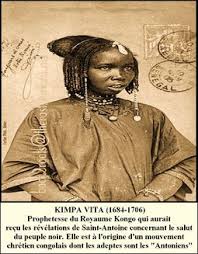A Dollop of Faith
Let us get one thing out of the
way, no one deserves to be burnt at the stake for their beliefs. Although
chances are that you would have gotten a markedly different reaction if you had
told that to the Catholic establishment in 16th century Angola. The
Catholic went to this very extent to preserve the “purity” of their teachings
as they endeavoured to grow Christianity in Africa during the sixteenth century.
Perhaps we can speculate that the Catholic authorities had witnessed the bewitching
power of religion and as such knew how potent a weapon religion was, especially
in the hands of a populace that was reluctant to ask why or how and had deep superstitions
well and truly entrenched in their ways of life. So they recognised that just
as easily as they had used religion to gain control over the masses, someone
else could use religion’s tendency towards communal thinking against the very purveyors
of Christianity.
And so, on 2nd July
1702, in the then kingdom of Kongo which is modern day Angola, a momentous occasion
took place in the continued interface between Christianity and the local
indigenous African religions. 22 year old Beatriz Dona Kimpa Vita was burned at
the stake for heresy. Her major crime being making the claim that Jesus and
Mary the mother of Jesus were Kongolese (Angolan). She had made the claim two
years earlier when she declared herself possessed of the spirit of St Anthony.
Surprisingly and much to the shock of the church authorities these claims led
to her having enough followers to worry the religious establishment then.
Accused of heresy and witchcraft, she was burned at a place called Evulu in
modern day Angola.
Beatriz Kimpa
Back home, Alice Mulenga Lenshina
(“Lenshina” was a bastardization of “Regina”) and her Lumpa church fought a
bloody war in the lead up to Zambia’s independence in 1964. She too like
Beatriz Kimpa had received her own version of “The Light”, amassed a growing
number of followers and was soon planting churches all over the country and
beyond. Initially tolerated by both the mainstream churches at the time and the
state, she later earned their chagrin when it seemed that her supporters were
pursuing a separatist agenda. Accused of practicing a strange brand of
Christianity and seen as being aloof over their indifference towards the
independence movement and the obvious popularity of their brand of
Christianity, the Lumpa church was seen as a serious thorn in the government’s
flesh. It wasn’t long before flashpoints began erupting in Lumpa strongholds,
leading the government to destroy the Lumpa camps. The Lumpas would not take this
lying down, leading to carnage at a scale not seen in those days as hundreds of
Lumpa church members were butchered by government forces, while the Lumpas also
gave as good as they received though using primitive weapons and a strange
choice of bullet-shield (it has been reported that Lumpa church militants were
told to smear their bodies with human excreta as a way of warding off the
bullets from government forces). Eventually the Lumpa cells were ransacked, its
members scattered or butchered and their Leader placed under house arrest in
Chilenje, where she eventually died of back complications.
Drawing on the alluring and
semi-hypnotic powers of religion, our political players have continued to spare
no effort in tapping into religion in their sometimes desperate quest for votes
and popularity. The 2016 election campaign period had more allusions to God
than a Nigerian movie as political parties jostled for votes. Not surprisingly,
God made his way into the campaign messages; I saw more than a smattering of
posters bearing leaders of political parties affirming their staunch belief in
God and topping that with a generous dollop of a Biblical verse.
As if that wasn’t enough, a
flurry of the “accidental” sighting of political leaders leaving church or a
carefully contrived photograph depicting certain political actors in one of
those unquestionably pious postures while seemingly engrossed in deep prayer
and reflection made its way into social media. If you thought this wasn’t a competition,
well think again. Such images would only be beaten by a NEWS clip of the same
politicians reverently muttering and mouthing words of praise while waving
their arms in an unmistakable sign of pious adoration to the creator.
It was clear, that the political
gravy train was in town, in church and it needed legitimacy and endorsement
from men and women of the collar and their followers. Sensing an opportunity,
the Christians responded by dipping their spoons, sometimes as huge as spades
in the political gravy train (afterall, barring a serious eventuality, the
train would only be seen five years later). For the gravy was brimming with
money, influence and stardust. Prayers were instantly answered, visions hastily
constructed and relayed much to the amusement of those of us that saw and
continue to see through the charade.
A few years ago I wrote
questioning the wisdom of declaring an entire country a “Christian” nation. My
thesis basically was that the constitution guarantees us freedom of worship
according to the dictates of our conscious and that in the grand scheme of
things claiming an entire country for a religion was not only short-sighted but
cajoled the rest of us, even though clearly in the minority into subservience
towards this version of “truth” called Christianity. I also noted that state
and religion are not very good business buddies ( as history has shown), and I
have noted that many notable sectors and thinkers have since expressed more or
less the same opinion now that the President has created a Ministry of National
Guidance and Religion.
Now I understand the President’s
eagerness to reward those that voted for the Patriotic Front for no other
reason other than their visibility in church and the declaration of those
frenzied days of fasting and prayer, but I have serious reservations about the
operationalisation of a Ministry of National Guidance and Religion. Apart from
calling for and presiding over national prayer events, I can’t see much that
the ministry will be doing. I do not envy those that will be tasked with
drafting the terms of reference of the new ministry. By “National Guidance”,
are we to take it that this is the official propaganda arm of the government? Then
there is the “Religion” part. Are we going to have religion inspectors, who
will be seating in on sermons in church so that they affirm that the Christian
religion is practiced as required by the Ministry? Kaya!
Interesting times. I am off to
Livingstone for a week, hoping I can come back with some exciting tales. (Turns out I spoke too soon. The Livingstone trip was postponed)


Keith,
ReplyDeleteOkay too many issues I could pick up on there;
But I think two things really come out here. First is the allure that religion has on the followers, especially our women. The fact that people will eat grass without questioning as long as the 'man of God' says so. This is something else. Its sad because all sorts of people including the educated and the rich are all falling prey to this.
The second issue is also building up on the first. Because politicians know the power of religion, you are going to see more politicians out do each other on who is hollier than the other. Ministries will be formed government Tabernacles will be built etc. In being truthful, politics and religion cant be performed in the same breath. They may work side by side but not as one entity.
Ever grateful for your support. Watch out for the National Guidance inspector at your local church...
ReplyDelete